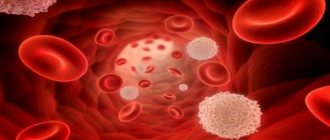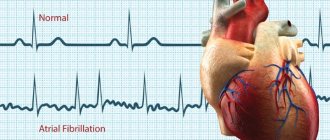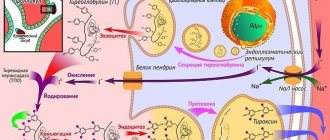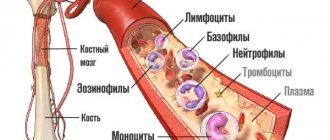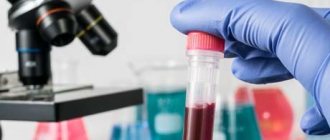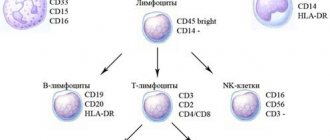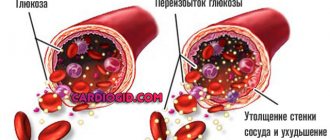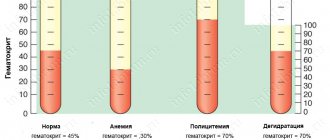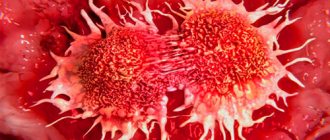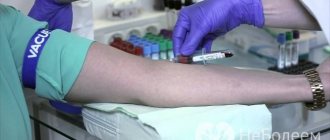Creatinine is a chemical substance that is formed in human muscles during physical activity as a result of the breakdown of chemical compounds (creatine - creatine phosphate reaction), which are the source of energy for the contraction of muscle fibers. From muscle fibers, creatinine enters the bloodstream and, after purification of the blood serum by the kidneys, is completely excreted from the body in the urine. An increase in creatinine in the blood is called hypercreatinemia and indicates disorders of the excretory or musculoskeletal systems of the body.
To determine the normal level of creatine phosphate reaction products, the first test is a biochemical blood test for creatinine, which is performed if renal failure is suspected.
Normal creatinine level - table
The normal level of creatinine in the blood of women is significantly lower than that of men. There is a difference in normal values due to differences in muscle mass.
With age, creatinine levels change. The normal level of creatinine in the blood of women after 60 years is from 50 to 110 µmol/l. The normal level of creatine in the blood of men after 50 years is 98-132 µmol/l.
Reasons for the increase
The condition in which an increase in creatinine is determined is called hypercreatininemia. Deviation can be the main diagnostic indicator or serve as an additional criterion for confirming many pathological disorders. An experienced doctor can, based on the results of biochemistry, presumably determine the disease depending on the degree of deviation from the norm. Such a slight and moderate increase (up to 10 µmol/l) occurs with the following pathological disorders:
- renal failure (stages 1 and 2);
- damage to liver cells as a result of exposure to toxic substances, inflammation or cirrhosis;
- necrosis (death) of the skin and tissues of internal organs;
- extensive traumatic and burn lesions;
- thyrotoxicosis (excess thyroid hormones);
- nephropathy caused by diabetes mellitus;
- hyperfunction of the adrenal cortex;
- myasthenia gravis is an autoimmune disease manifested in pathologically rapid fatigue of striated muscle tissue;
- prolonged toxic effects on the body of toxic substances;
- severe forms of infectious diseases, including those accompanied by accumulation of pus;
- side effect from taking medications with nephrotic effects;
- autoimmune diseases (rheumatism, systemic lupus erythematosus and others);
- dehydration of the body;
- heart failure in the stage of decompensation;
- toxicosis in pregnant women.
Significant excess of the norm (over 100 µmol/l) is characteristic of such pathologies as renal failure (grades 3 and 4), muscular dystrophy with extensive destruction of muscles, muscle mass compression syndrome, diffuse myositis (inflammation of skeletal muscles), severe infectious lesions. If the analysis shows high creatinine, then a repeat blood test is necessary to rule out an error. If the values are similar, the doctor will prescribe an additional examination to confirm the presumptive diagnosis.
Causes of high creatinine levels in the blood
The causes of increased creatinine levels can be divided into two categories:
- Associated with physiology (caused not by disease);
- Pathological (arising as a result of a disease).
Let's look at both categories in more detail.
Physiological:
- The size of muscle mass in the body. What does it mean? The greater the muscle mass, the higher the creatinine level (therefore, the norm of creatinine in the blood in men is much higher).
- Increased physical stress on the body (with physical overload of the body, an increase in creatinine levels in the blood occurs).
- A diet with a high meat content (if creatinine in the blood is increased, this may be directly related to the large amount of animal fat consumed in food). In the blood of women after following a protein diet, deviations in the normal creatinine may be detected.
- Taking certain medications (cephalosporins, tetracycline antibiotics).
Diet
Therapeutic nutrition for increased creatinine in the blood consists of eliminating foods from the diet that put a strain on the kidneys:
- purine compounds - when digesting proteins of animal origin (they contain purines), an additional concentration of creatinine, uric acid, urea, etc. occurs, which must be removed from the body;
- phosphates (phosphorus salts) are vital compounds, but in excess they lead to a decrease in calcium levels in the body (present in meat, fish, canned food, and in products with preservatives in their composition).
In order to reduce creatinine in the body (in the blood and in the urine), therapeutic diet table 7, as well as table 7a and 7b, are used, which are prescribed at different stages of acute and chronic nephritis.
To improve the excretory capacity of the kidneys, the diet consists mainly of plant carbohydrates with a minimal amount of protein. If there is a high level of creatinine in the blood, the main diet should consist of the following foods:
- vegetables (except potatoes), herbs, moderately sweet fruits, berries;
- dried fruits, nuts, honey;
- low-fat fermented milk products (cottage cheese, sour cream, fermented baked milk, kefir);
- cereal porridges and soups with vegetable broth;
- pasta from durum wheat;
- dietary salt-free bread;
- vegetable oil.
In limited quantities you can use:
- dietary meat (chicken, turkey, rabbit) 2 times a week;
- low-fat fish;
- potato;
- boiled eggs – 3 pieces per week;
- low-fat fish.
If creatinine significantly exceeds the norm, the above foods are completely excluded from the diet.
The drinking regime depends on the doctor’s recommendations and may include the mandatory consumption of 1 to 2 liters of liquid every day. In this case, all liquid is taken into account, including soups, jelly, compotes, etc.
When creatinine increases, the following foods are prohibited:
- fatty meats (pork, duck, goose);
- fatty fish;
- smoked and fried foods;
- hot seasonings and sauces;
- a lot of salt;
- baked goods;
- strong tea and coffee;
- milk.
In the process of cooking, preference is given to boiling, stewing, baking, and steaming.
How to treat?
Below is a little about how to treat this problem:
- Diet (excluding spicy foods, salt, seasonings, limiting animal fats);
- Elimination of excessive physical activity;
- Compliance with the regime of fluid intake, preferably water (for people suffering from kidney failure, the amount of fluid consumed per day by a person should not exceed the amount allocated by more than half a liter);
- Timely diagnosis;
- In complicated situations, they resort to hemodialysis (hemodialysis is a procedure by which the blood in the body is purified artificially);
- Drugs that promote protein metabolism (for example, Lempenefril);
- Homeopathy (herbal preparations).
Symptoms when creatinine is elevated
When determining the metabolic processes of creatinine, in the vast majority of cases, one has to deal with an increase in the concentration of CT. When high levels are detected, it is necessary to correctly take into account all gender and age factors, as well as the structure of the human body.
Hypercreatininemia is a condition characterized by an increase in the concentration of creatinine in the blood plasma. High CT readings do not lead to any serious complications, since creatinine itself is practically non-toxic.
It happens that its serious effects can manifest themselves with a sharp and significant increase in indicators. Most often, a violation of creatinine concentration occurs against the background of progressive diseases, indicating their course in the body.
That is why a separate deviation of creatinine almost does not manifest itself.
Its manifestations occur along with other symptoms of a disease progressing in the body.
The most obvious are:
- Pain in the muscles,
- Low physical endurance and muscle weakness,
- Swelling,
- A sharp decrease or increase in the amount of daily urine excreted,
- Detection of pathological abnormalities in the urine examined in the analysis,
- Manifestations of liver disorders (jaundice),
- Intestinal obstruction.
Symptoms of kidney disease
Kidney disease is one of the most common causes of problems with creatinine levels. The earlier this problem is diagnosed, the easier it will be to deal with it.
So, if the following symptoms are observed, then this is a clear sign of a kidney problem, which means you need to urgently consult a nephrologist and find out what medications you need to take.
- Lack of appetite;
- pain in the lower back (in the kidney area);
- increased urge to urinate;
- swelling;
- increased blood pressure;
- insomnia;
- strong feeling of fatigue;
- nausea.
Symptoms indicating high creatinine levels:
- dyspnea;
- dehydration;
- weakness;
- fast fatiguability.
The symptoms of kidney disease and changes in creatinine levels are similar to each other due to the close relationship between these ailments.
CT scan in urine
Despite the fact that the excretory system is very important in case of deviations in creatinine, it is often determined by urine analysis, which is collected over a period of twenty-four hours. Only twenty milliliters of the entire material are taken for analysis.
Factors that provoke increased excretion of CT in urine are the following:
- Infectious diseases of an acute nature,
- Excessive production of growth hormone and gigantism,
- Radiation sickness,
- Chronic compartment syndrome
- Decreased thyroid function and diabetes,
- Strong physical activity.
A reduced level of creatinine in urine is observed with:
- Excessive production of thyroid hormones by the thyroid gland,
- Chronic compartment syndrome
- Large-scale muscle damage due to traumatic situations and surgical operations,
- Amyotrophy,
- Use of certain medications (hormones, diuretics, antibiotics, barbiturates, etc.),
- Pathological blood conditions (blood cancer, red blood cell deficiency, etc.),
- In the initial stages of using adrenocorticotropic hormone,
- Acute dermatomyositis (a systemic disease in which skeletal and smooth muscle muscles, as well as the skin, are involved in the pathological process).
Lifestyle for people suffering from high creatinine levels
In order to control creatinine levels, lifestyle changes are sometimes necessary; this helps both in the treatment of this disease and in its prevention.
- One of the necessary conditions is drinking regime. With insufficient fluid intake, urine production decreases, while creatinine levels continue to rise.
- The next important factor is moderate physical activity on the human body. Excessive activity leads, as stated above, to an increase in creatinine, and by choosing the right load, on the contrary, you can help reduce indicators. This requires calm types of physical activity (Nordic walking, yoga, just daily walking).
- Sleep is a very important factor. Lack of sleep is also a burden on the body, causing stress in the human body. Healthy sleep for a healthy person should range from 7 to 9 hours a day.
- Complete cessation of smoking and alcohol.
What is creatinine
Creatinine is an important chemical compound in the human body, formed as a result of the breakdown of protein molecules. This substance is an integral part of residual nitrogen.
At the beginning of the chain of transformations is creatine. This component travels a long way throughout the body, starting in the renal parenchyma. Methylation occurs in the liver. After this, the substance is sent to the muscles, where creatine phosphate is created from creatine. The resulting component goes into myofibrils, where it breaks down into creatinine and phosphate, giving the muscles energy to contract.
After its use, the residues go into the blood. In the liver, creatinine is not affected because, due to its structure, it is excreted in the urine without any problems. This energy turnover occurs constantly, because of this the amount of substance in the circulatory system remains the same, provided the body is in a normal state.
The creatinine content depends on the condition of the person’s muscles and kidneys. Age and gender also affect its level in the body. An increased content of this substance indicates changes in kidney function.
Energy turnover
The process of converting creatine into creatinine using the resulting energy described above is quite complex. However, we use the result unconsciously. Who in life thinks that I need to raise my hand, and for this to happen such biochemical processes must take place? That's right - no one. But they pass, since man is a “biochemical machine.”
Everything happens literally instantly under the control of commands from the brain.
Suppose you decide to pour tea from a teapot into your cup. How does this happen? You must raise your hand, take the teapot, bring it to the cup and pour. What causes all these movements? Due to the energy that creatinine gives (releases) to the muscles. Readers write to us
I work as a cleaner. Buckets here and there. It became more and more difficult with age. But there is nowhere to go. Younger ones are needed. And from the age of 55, the pressure began to jump. At that moment my heart seemed ready to jump out. But you have to work. I thought that I would carry the next bucket and it would be the last.
Thanks to my daughter, she gave me an interesting article to read online . I’ve heard before about dummy medications that cost a lot of money. But in this article specifically knowledgeable people discuss the problem of us hypertensives.
Overall, this article literally changed my life. Now I can carry buckets all day long. And on the weekends I calmly garden for the whole family.
Anyone who suffers from pressure surges and wants to live an active life so that they don’t suddenly get a stroke or heart attack, spend 5 minutes reading this article .
Read the full article >>>
We will not delve into the complex process, but it is quite clear that in order to perform actions, our muscles must release the required amount of creatinine (that is, energy). This amount is determined by our body independently depending on many factors. Including muscle fitness.
It is no coincidence that the so-called “jocks” in gyms often use special supplements called “Creatine”. Allegedly, these supplements add raw material to convert it into creatinine, which supposedly allows you to pump up huge muscles. In fact, these supplements do not work (personally tested by the author of this article) as we would like.
So, having used the released energy, the body is not able to process the excess in any way and the excess creatinine must be removed from the body.
Traditional medicine in the treatment of elevated creatinine in the blood
If a person does not take any action, the level of the substance will not decrease on its own. What home treatment methods can be used?
Recipes from traditional medicine may only be appropriate as an addition to the main treatment, which should be selected and prescribed by the attending physician!
- Rice breakfast. 5-6 tablespoons of cereal should be poured with two glasses of boiled water and left overnight. In the morning, cook porridge from the resulting mass, but without adding salt or sugar. The porridge should be consumed in two parts. First eat half, then after 1.5-2 hours the second part;
- A decoction of lingonberry leaves. It has a mild diuretic effect. For one glass of hot water you need 2 tbsp. l spoons of lingonberry leaves. Pour boiling water over the leaves, cover with a lid and simmer over low heat. Drink the resulting decoction three times (morning, lunch, evening).
- Drink made from rose hips. For two liters of hot water 2 tbsp. l mashed rose hips. Place the fruits in a thermos and fill with hot water for 8-12 hours. Cool the resulting drink and strain. Drink 2 glasses per day.
- Cinnamon has a diuretic effect. You can drink it with tea or simply add it as a seasoning. You can take cinnamon along with ginseng or dandelion;
- Positive emotions. When a person is favorably disposed to solving this problem on a subconscious level, positive commands are sent to the brain, which in turn have a beneficial effect on remission (recovery).
How to prepare for the analysis?
If pathological conditions of the kidneys are suspected, as well as obvious deviations in creatinine, a biochemical blood test is prescribed, which is very informative, in contrast to a clinical analysis, which provides general information. Biochemistry gives indications about the condition of almost all organs, including the kidneys.
In order to exclude the influence of physiological factors on the test results, you need to prepare before donating blood. This is done in order to prevent false results.
The actions that must be performed when preparing for analysis for creatinine and urea are:
- Blood is donated early in the morning, on an empty stomach. To avoid deviations in blood counts caused by various foods that affect the composition of the blood, food intake is limited at least eight hours (preferably more than ten) before the time of blood sampling. That is why the test is taken in the morning, since a person will not feel hungry at night. It is also prohibited to drink any drinks (tea, coffee, soda, energy drinks, etc.),
- Refuse to eat fatty, highly salted, spicy, overcooked foods that are difficult for the body for at least twenty-four hours (preferably forty-eight hours). They violate certain blood parameters, which can lead to false diagnosis,
- to stop playing sports and avoid strenuous physical activity as much as possible , two days in advance, since physical effects on the body also affect the final results,
- Visiting a sauna, steam bath, or hot bath the day before can lead to fluctuations in normal values,
- Limit alcohol intake and cigarette consumption at least 24 hours before the upcoming test.
- Stop using medications at least two days before the test. Drugs of certain groups can affect the parameters of a biochemical blood test. If it is not possible to stop using medications, you must inform your doctor about the use of medications. The doctor will make adjustments to the results, taking into account the effect of a particular drug on human blood,
- Come to donate blood 10-15 minutes in advance . This is necessary so that the body calms down, shortness of breath goes away, and the body acclimatizes to the temperature conditions of the room (especially after a cold street).
When analyzing urine for creatinine, the patient is instructed to correctly collect the material. After completing all the steps, the jar with the material is brought to the laboratory on the same day. Diet and lifestyle do not need to be changed.
Medicines, as well as other simple methods that help combat this disease
- People suffering from diabetes need to control their insulin levels. It is important to select hypoglycemic drugs, such as NovoNorm containing Repaglinide, but they must be selected in conjunction with a doctor;
- For people with arterial hypertension, it is necessary to select drugs that lower blood pressure. These may be drugs with an active ingredient such as hydrochlorothiazide or benozepril;
- Medicines aimed directly at reducing creatinine in the blood. Ketosteril, the dose of which is selected individually and ranges from 4 to 8 tablets per day (a drug of ketone analogues of amino acids, most often used for renal failure, helps restore glomerular filtration of the kidneys);
- Alpha lipoic acid (activates kidney function and helps neutralize toxins);
- Laser physiotherapy. This is not a drug treatment, but cold laser or low wavelength laser may help improve kidney function. As a result, renal filtration improves. This treatment method also helps normalize sleep.
- Massage helps blood circulate throughout the human body - this helps reduce stress and relaxes the body.
- Lespenefril. A herbal preparation that is used to improve renal filtration of urine. Helps remove toxins. Reduces the amount of nitrogen in the blood. The daily dose of the drug is 1 or 2 teaspoons. With long-term use of the drug, the daily dose usually ranges between half a teaspoon and one teaspoon.
Always remember that it is important to pay attention to the symptoms of the disease in a timely manner, consult a doctor and get qualified help from a specialist!
Creatinine test
The main task of a blood test for creatinine, which a doctor can recommend, is to identify problems with the urinary tract.
systems (mostly kidneys). The fact is that if the kidneys are working well, there are no problems with excretion and the creatinine norm is maintained. But exceeding the norm may indicate the presence of any hidden diseases, kidney diseases, namely renal failure.
A blood test for creatinine levels is required if:
- You are a kidney donor;
- you suspect renal failure, urolithiasis or diseases of the muscular system;
- To determine the exact dosage of a drug with a toxic effect on the body.
To determine the level of creatinine in the circulatory system, you need to donate blood for a biochemical study. To obtain a reliable result, you must stop drinking alcohol, coffee and strong tea one day before, and also not abuse protein foods, such as meat. Avoid increased physical activity.
The analysis is taken in the morning on an empty stomach from a vein. Before taking the test, you need to sit for some time in a calm and relaxed state. The analysis study begins immediately. The result will be ready on the same day.
Rehberg's test
Otherwise, this test is called “creatinine clearance” and is a more thorough method of determining its level. It determines the presence of renal failure and the effectiveness of blood flow through the renal glomeruli. To carry it out, two biological media of the body are donated - urine and blood.
